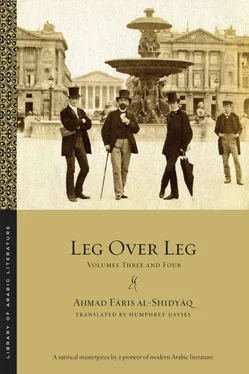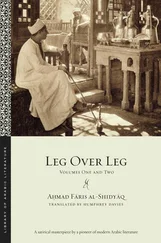3.2.9
I further declare that it is a fact, deeply rooted in our sticky human clay, that when a man sets his heart on getting married, God endears his spouse to him however she be and makes him believe she’s the best of people, morally and physically. And that’s not all: the man may well believe that he’s been elevated above his peers and distinguished among his brethren to the point that he dismisses as trivial what previously he saw as important and imagines that he has become a new person, for whom the face of the earth ought, by rights, to be remade. It follows that the Fāriyāq no longer found contentment in the old familiar songs and poetry; instead, he substituted for them other, new ones of his own composition. In the process, he composed two poems 17in which he attempted to invent a strange new style, with the result that they turned out quite titter-making, as you shall see — and had he had the ability to invent a new form of speech to express his passion and rejuvenation, he would have done so.
3.2.10
Thus, should he lay eyes on a married man, he’d call out to him and sing as follows:
On the racetrack of marriage, I’m the front-runner
While you’re the also-ran last-placer.
My shaft soon will take the prize
While your luckless stick’s a failure. 18
Or, should he see a bachelor, he’d tell him:
Bachelors, the creed of the single man
I have renounced, so do as I have done.
There is no wealth but marriage, so have at it, friends:
Enrich yourselves and gain what I have won.
And one day, infatuated with the idea of creating something strange and new, he became obsessed with the idea of composing a collection of poetry that would consist entirely of single verses. 19He wrote four and then gave up. They were:
Like a month is an hour of separation from you, but a year
In your company passes like an hour.
I spend the long night gazing at the stars enamored—
My contemplation being of heavenly bodies that are rounded.
My heart beats unbidden whene’er the east wind rises,
And the bright moon recalls to me your countenance.
Would I might know how long a heart that melts as it endures
Can suffer from separation in its many modes.
It would be officious of us to say here that he used to tell his fiancée, “You are the delight of my eyes, and I believe you to be the best of humankind. We are the envy of others and with you I have no need of riches. When close to you, I’m glad , when far, I’m sad . We shall always be as we are now. Your beauty distracts the unwed and I’m jealous of the breeze that ruffles the jet black tresses on your head . We are two bodies with one soul or two souls with one body. Each day you’ll find in me a lover new and all the time I’ll find fresh charms in you . We shall be the paragon of spouses and of lovers,” and so on in the usual vein adopted by such as he.
3.2.11
Another thing he said was that the best days of a person’s life are those immediately preceding and following marriage. I note: according to the Franks these number a month, which they call “the moon of honey ( ʿasal )” and which follows the wedding. According to us Arabs, however, they number two, are called “the two moons of intercourse ( ʿasl ),” and last till the hive has been filled, every bee has reverted to being a hornet, and everything has gone back to the way it was. I note further that love is something planted in our human clay the day we’re placed in the cradle and that lasts till the day we’re laid on the bier. The human must inevitably therefore feel love for some person or other, some object or other, some abstraction or other, and the more his love grows in the area of one of these loci, the further it declines in another. At the same time, one of these loci may become a stimulus to his adding love for another. An example would be a person who devotes himself to poetry, singing, or painting and whose devotion to these things becomes a spur to his loving a beautiful person. One who devotes himself to scholarship or fighting or honor or the exercise of power must inevitably lose some of his desire for women; indeed, he may be too busy to think about them at all. One who devotes himself to purebred horses and fine weapons may find that this devotion is an incitement to love of another or not, as the case may be. Some count among this last kind the sarābātiyyah , who are the latrine cleaners, but others exclude them from it on the grounds that they practice a profession that people are forced to undertake to make a living, not a pastime that people undertake because it suits them to do so. 20
3.2.12
The preceding are three states deriving from three different stimuli. There are a further three states with respect to paucity, abundance, and their midpoint. The first is one of parity and consists of the lover loving his beloved as he loves himself; thus he never indulges himself in anything or pleasures himself with anything unless the one he loves is there to share that pleasure with him. This is how men are before and just after they get married, and it is not inconsistent with good sense and judgment. The second is the excessive, which is to say the one that goes beyond parity and consists of the lover loving his beloved more, as it were, than himself; it is characteristic of fathers and mothers in their love for their children and of certain lovers. The father will sacrifice his own life for that of his offspring and deny himself pleasures and treats so as to use them to give them pleasure: if he finds himself incapable of eating or of enjoying marital relations while his son enjoys both, this makes him happy. At the same time, however, he is not devoid of good sense and judgment. The lover may prefer the object of his affections to himself but unlike the parent behaves in a disordered way, doing things that are inappropriate to their place and time. The third is the ordinary situation and consists of a person loving his beloved but loving himself more; this is the commonest.
3.2.13
There are also three locational states, namely proximity, distance, and their midpoint, and these have different impacts depending on the differences among people’s dispositions. One whose love is true will love to the same extent whether he be near or far; indeed, separation may urge him on to greater longing and passion. No one has described this situation better than the one who said
Methinks the beloved a sun that separation
Refuses to take as “oryx doe.” 21Rather, it makes it burn yet hotter.
The free-grazing male, on the other hand, the one with a roving eye, never puts one leg forward without holding the other back.
3.2.14
There are a further three states that are temporal. These are childhood, youth, and maturity. The affection of the child is that most quickly given and the most tenacious, that of the youth the hottest and strongest, and that of the mature person the most firmly grounded and longest lasting. The mature person also values his beloved’s good qualities and advantages more highly and his love for that person is both more bitter and more sweet. The bitterness comes from his knowing that he is exposing himself to the reproach and censure of the reproachful and censorious among the young and inexperienced, as well as to his own anxiety that his beloved may grow bored with him. Thus his heart ever burns , his mind to his beloved ever turns . The sweetness comes from his greater awareness of his beloved’s worth, as noted above, and from his love being as a result permanent and strong, for he believes with all his heart that he is pursuing what will bring him happiness and his due portion of good fortune.
Читать дальше












